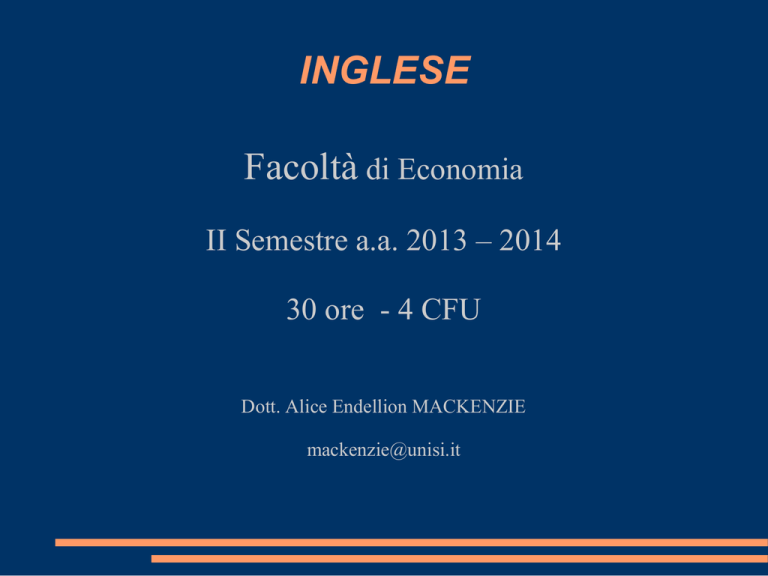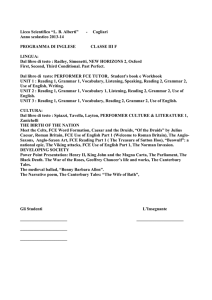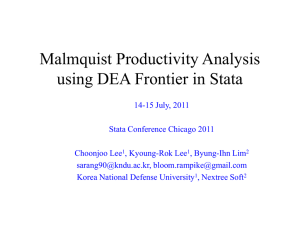INGLESE - Dipartimento di Studi aziendali e giuridici
advertisement

INGLESE Facoltà di Economia II Semestre a.a. 2013 – 2014 30 ore - 4 CFU Dott. Alice Endellion MACKENZIE mackenzie@unisi.it Prerequisiti Livello B1 - COUNCIL OF EUROPE (PET – BEC- preliminary) BEC – Idoneità Già consegnato e verbalizzato online IMPORTANTE Se la prenotazione all'appello non rispetta la sequenza stabilita dalle regole di propedeuticità l'esame sostenuto sarà annullato. Il B1 deve essere già verbalizzato online per poter accedere all’iscrizione all’appello della prova d’Inglese di questo corso. Esame Fuori Corso L’esame fuori corso è riservata agli studenti: - fuori corso - a tempo parziale - agli iscritti all’ultimo anno di corso per l’anno accademico di riferimento Course Level: B1 + / B2 Lavorando verso B2 Working towards level B2 In the Common European Framework of Reference I risultati I risultati con l’esito della prova saranno sempre caricati sulla segreteria online dopo una o due settimane max. www.https://segreteriaonline.unisi.it Valutazione della Porva: IDONEO / NON IDONEO Verbalizzazione sul libretto cartaceo Sarà possibile verbalizzare la prova sul libretto cartaceo durante ricevimento. Controllate online per eventuale variazioni con avvisi riguarda l’orario di ricevimento Ricevimento Mercoledì dalle 12:00 alle 13:00 mackenzie@unisi.it Durante periodo delle lezioni Presso Dip. Studi Aziendali e Giuridici Laboratorio Linguistico Calendario Inizio corso: 7 marzo 2014 Fine corso: 9 maggio 2014 Gruppo [00-49] Mercodelì dalle 10:00 alle 12:00 Aula Caparrelli Venerdì dalle 08:00 alle 10:00 Aula Caparrelli Gruppo [50 – 99] Mercoledì dalle 14:00 alle 16:00 Aula Caparrelli Venerdì dalle 10:00 alle 12:00 Aula Caparrelli AIMS To improve reading comprehension skills and help develop general awareness of the particular language used in economic or business type articles. To become more familiarised with a set of business and economic vocabulary via the acquisition of the key words and phrases and via the analysis of their patterns of collocation and word formation. To consolidate language accuracy via the analysis and practice of the key grammar items from B1+ up to elements of B2 level. To enhance writing skills in an economic or business context in such a way to encourage students to writing more effectively and appropriately. Course Reading and Vocabulary Topics Companies and Start-ups Finance and Corporate Governance Marketing and Advertising Manufacturing and Productivity Innovation and Creativity Describing Statistics/ Graphs and Trends/Numbers Jobs: Job Seeking -Recruitment – Interviewing Career Management –Job Motivation -Absenteeism Protecting the Environment Economics and Happiness E-Business Trade – Fair Trade - Ethics Writing Focus • Business letters Letter of complaint Letter of enquiry Thank you letters Letter of appology Invitation to conferences E-mails for making/confirming arrangements Job application letter /cover letter Rejection letters – Letter of appointment – and corresponding replies Grammar Content (B1 + - B2) Present simple and continuous, present perfect Past simple, past continuous, past perfect simple and continuous Future forms (be going to + inf, present continuous, will/shall + inf All conditionals and future time clauses Future perfect and future continuous The Passive: All forms Gerunds and infinitives Comparatives and superlatives Adjectives, adverbs and adverbial phrases Phrasal verbs (a selection) Relative pronouns and defining/non defining relative clauses Reported speech Modals of obligation, deduction, ability and possibility Past modals (must/might/can't, etc. + have past participle) Structures after wish Used to/ be used to/ get used to Clauses of purpose and contrast Prepositions in economic context You should already be familiar with the following grammar questions and able to answer them. Make sure you also cover the B1 + level and some B2 elements of grammar which will be covered in this course: See part II of grammar section in Dispensa for B2 elements. Grammar type questions B1 level 1 She _______ if he’d ever been to Spain. a) said b) told c) told me d) asked 2 The product _______ three times before it goes to the packaging area. a) is tested 3 b) tests c) are testing d) are tested They are planning _____ their new campaign next Spring. a) launch b) launching c) to go launching d) to launch 4) You look exhasted! I am. I ………………infront of the computer all morning. a)worked b)have been working c)did work 5) How long………….you ………….English? Since October. (learn) 6) When I woke up this morning, I could hear that it …………very hard. (rain) 1: Which one of the following expresses a future possibility? John ____________ computer science at university next year. a) might study c) will study b) is going to study d) is studying 2: Which one is NOT possible? I'll call you when __________. a) I've arrived c) I'll arrive b) I'm arriving d) I arrive 4: Which future form is correct and natural? Guess what? _____________ married next spring! a) I'll get c) I'm going to get b) I'm getting d) I get 5: Which expression describes time in the past, and not the future? a) from now on b) one day c) in the old days d) sooner or later 6:Which sentence expresses a definite future intention/plan? Mary ______________ a new house. 1. might buy 2. may buy 3. is going to buy/ is buying 4. is thinking about buying Other grammar type questions: Transform and finish the sentence to have the same meaning: 1) «Have you got the documents we need?» She asked whether I …………………………….. 2) “Are you still working for Novartis?” He asked if I …….still ……………..................... You also need to know (B2) • Third Conditional • Structures after Wish • Future time clauses • Future Perfect and Future Continuous • More verbs which take Gerund or Infinitive • Past modals: must/might/can’t etc. + have + past participle (deductions and speculations about past actions) • Reporting verbs (some) Grammar Practice online http://www.examenglish.com/FCE/fce_grammar.htm http://www.bbc.co.uk/worldservice/learningenglish/q uizzes/quiznet/archive_2003.shtml 15 Lessons • 1 - Course Presentation • 2 - Companies • • • 3 – Company Finances • 4 – Marketing and Selling • • 5 – Brand Management • • 6 - Advertising • 7 –Innovation & Creativity • • • 8 –Describing Statistics 9 – Graphs and Trends • 10 – Economics and Happiness/E Business 11 – Business and the Environment 12 – Jobs and Recruitment 13 –Jobs and Career Management 14 –Writing Emails and Letters I 15 – Writing Emails and Letters II Companies • Setting up business, the founders of companies, company success Different types: Mergers, takeovers, partnerships, multinationals, joint ventures, family businesses, high-tech corporations. Company changes: company structures in the past and in the present. Standardised/customised production What kind of changes? Re-locating, out-sourcing, off-shoring Different types of companies: mergers, multi-national, subsidiaries, joint-ventures How companies face change. What are the challenges? Are they threatened? Companies and globalisation. Companies and productivity – Manufacturing – Groups of people in companies: shareholders, management, workforce Companies and Corporate Governance Company financial performance, financial reporting: regular or irregular? (Auditors like SEC) We are talking about mismanagement and irregularities, accounting failure, bankruptcy Corporate rule? More strict? Company investigations and financial risks as a consequence of globalisation Scandals (like Parmalat, Enron, Ahold) Companies in dept due to overstating their profits Financial Terms Market shares Shareholders Turnover/Revenues Dividend, gross profit, net profit…. Depts/credits Margin/mark up/ profits … Stock exchange Capital Loan leasing MARKETING and BRANDS The various activities of the marketing activities: the so called marketing mix: the “4 P”: Product, Price, Promotion and Place. Marketing and Brands: Brand image Images linked to products; people's attitudes to brands. Do brands provide us with beliefs? Do brands stand for what they really are? Describing functions and quality of products Are people vulnerable? Are we manipulated into buying things? What products appeal to customers? What is brand loyalty? brand image? Brand stretching? Brand awareness? Selling and Marketing - Advertising Different traditional selling methods: sales promotions, sponsorship, public relations, advertising media, direct marketing… New ways of marketing: “guerrilla marketing” a different approach. Online advertising: pop-ups, banners…(controlled) word of mouth What is a sales pitch? A sales rep? (representative) An advertising campaign? Branding? A dealer? Agressive/soft talk How difficult is it to market your product successfully?Marketing and targetting a market: potential customers (market research) Who are your potential customers/clients? PRODUCTS lifecycle of products Product range Product placement Product endorcement Lauching products Sales forecasts Other terms and key words to go into companies Suppliers Wholesalers Retailers Sponsorship Describing statistics Describing trends and graphs: Increase, rise, decline, jump, soar, plummet, rocket, slide, nosedive, fluctuate… What is a peak? a drop? a recovery? Adjectives and adverbs? Used to describe to what degree, by how much and how fast trends change. Dramatically hugely or slightly moderately significantly, substantially, rapidly, sharply Describing statistics You need to be able to interpretate graphs and trends You need to be able to use prepositions in this particular area of the language: Eg: the share price rose to 16 euro by 15 % Understand the importance of linkers in graph descriptions: while/ whereas/ although/despite Example: The prices of petrol had plunged in Spain last month whereas the prices of petrol in France were still gradually increasing. Graphs and trends continued The difference between similar verbs: rise/raise. Does the price of petrol rise or raise as a result of the political issues taking place at the moment. Are these transitive or intransitive verbs? Do they take an object? Jobs and Recruitment Here we are focussing on language to express different ways for getting a job. Job advertisements, internet, personnal contacts... We are therefore talking about «job-seeking» The online job market: job-search website. What different work experiences one can get before a permanent job: work placements, apprenticeships, graduate trainee schemes, stages… What kind of work? Part-time?shift work?Tele-work? Sample vocab To get promoted To apply for an interview To be sacked/ to get the sack/to be made redundant/ unemployed/to be dismissed/ to be disbanded/ to be fired To have a salary/ to be on the dole To be shortlisted for a job/ to be accepted/ to be rejected/ to be selected What are skills? Qualities? Qualifications? References? Referees?Achievements? Job Motivation and Recruitment in HR (Human Resources) Job satisfaction and job motivation What different ways can a company motivate its employees? What is the difference between: employer and employee What about candidates and applicants? And interviewer and interviwee? An interview? About jobs … Does pay depend on job description? Or job productivity? Or by raising productivity? Word formations: Example: word formation An applicant applies for a job To apply for a job/ a post To send in your application Example: Word collocation: To fill in an application form To meet a deadline to hand in your application To make a complaint about a problem Productivity Here we are talking about productivity in manufacturing context. The way companies can improve their productivity. We will be talking about the suppliers and the manufacturers and the application of «just in time delivery» or BTO «built to order» and sales forecasts, assembly lines, delivery, quality control, staff shortage Other terminology: stock, warehouse, efficiency, wasting resources, cutting costs Competition There are many idioms (expressions) used when talking about competition: What is their origin? Sport? Water? We will focus on common expressions used for a better understanding of the articles. Eg: «be neck and neck» = fair competition « a one horse race» = the only competitor (no other rivals) Innovation and Creativity Innovation and new designs for products making better returns/ generating profits Launching new products What is a breakthrough? (an important discovery or development) What is a prototype? (a first or preliminary version of a device from which other forms are developed) Innovation continued Entrepreneurship: Entrepreneurs and their willingness to take risks and identify opportunities – Success? Or failure? New ideas/ the ability to seeing things from different perspectives… The abilty to spotting the need for new techniques or devices. TRADE and Globalisation Does globalisation damage local (goods, services or cultures) Does globalisation have an impact on living standards? Does it increase competition between companies? We will be talking about the Fair Trade Market: A new area giving hope to smaller producers to survive after suffering from globalisation. A solution to the world to tackle poverty and save farmers from bankruptcy. Key words: subsidies, deregulation, wealth, prosperity, survival, dumping, tariffs, quotas, customs, breaking into new markets, to booming or declining trade. Trade Celebrities and Charities Here we will be talking about the involvement of celebrities in international politics and economies. Celebrities hope or aim to change/influence the relationship between governments and charities. Key terms: debt relief campaign (to draw attention to problems like for example the need to lift quotas and duties. Lobbying, boycotting…. Economics and Happiness Here we are talking about the relationship between happiness and wealth/ happiness and economics. Evidence from economists and psychologists has shown that our wellbeing depends on cooperation and the public good not on personal enrichment. Environmental Issues Here we are talking about Green Issues. The role of business in protecting/destroying the environment. Does international business community have responsibility or a role to play to sustain the natural resources it commercially exploits? Key words: sustainable development exploitation,waste, resources, pollution, emissions renewable energy, biodegradable materials, consumption, recycling «Are we doing are bit for the environment?» what solutions are there for the plantet? What are the goals? What’s on the agenda? Reading: useful text books • • Intelligent Business, Christine Johnson (P. Longman) – intermediate Market Leader, D.Cotton, D.falvey, S.Kent (P. Longman) – intermediate New Business Matters - Coursebook, Powell, Martinez, Jillett (Thomson &Heinle) Intermediate/Upper-intermediate Business GOALS 3 – Workbook, Gareth knight (Cambridge Professional English) Longman Business English Dictionary Business Benchmark, Norman Whitby (CUP) Preintermediate to intermediate) Advanced Grammar in use, Hewings, M (CUP) Email English, Paul Emmerson (Macmillan) More reading: English for Economics, Business & Work, Autore: Giulia Corazzza – (Gruppo Editoriale: Simone) Livello del corso d’Inglese B1 + verso B2 Course Material DISPENSA Available in the copisteria copinfax in via Rossi. Students are asked to have this for attending the lessons. Other material will be made available during the course itself. EXAM Duration: 1 hr. 30 min Four Sections I. Reading - 30 min II. Vocabulary - 20 min III. Grammar - 20 min IV. Writing - 20 min Exam Dates: check online Summer: • 24 June 2014 • 16 July 2014 Autumn: • September 2014 • September 2014 Winter: • January 2015 • February 2015 Part I: Reading comprehension based on articles from the Economist or The Financial Times (similar to those studied during the course): gap filling, paragraph order, matching, multiple choice, true/false, open questions. Part II: Vocabulary: Lexis deriving from topics covered in the course: gap filling, matching, multiple choice, word collocation, word formation. Part III: Grammar: multiple choice, sentence transformation with same/similar meaning. Part IV: Writing: letter, email, fax, graph/table description (about 100 words). Exam Example: for writing section Reply to an email: (about 100 words) Write a reply to an application letter making sure you do the following: - Thank the candidate for the letter - Give the news that she is not shortlisted for the post - Explain the reason why - Express good wishes. Typical starting sentences • With reference to your letter of 8 June, I ... • I am writing to enquire about ... • After having seen your advertisement in ... , I would like ... • Thank you for your letter of 8 May. • Thank you for your letter regarding ... Typical ending sentences If you require any further information, feel free to contact me. I look forward to your reply. I look forward to hearing from you. We look forward to a successful working relationship in the future. Should you need any further information, please do not hesitate to contact me. Once again, I apologise for any inconvenience caused. I would appreciate your immediate attention to this matter.

